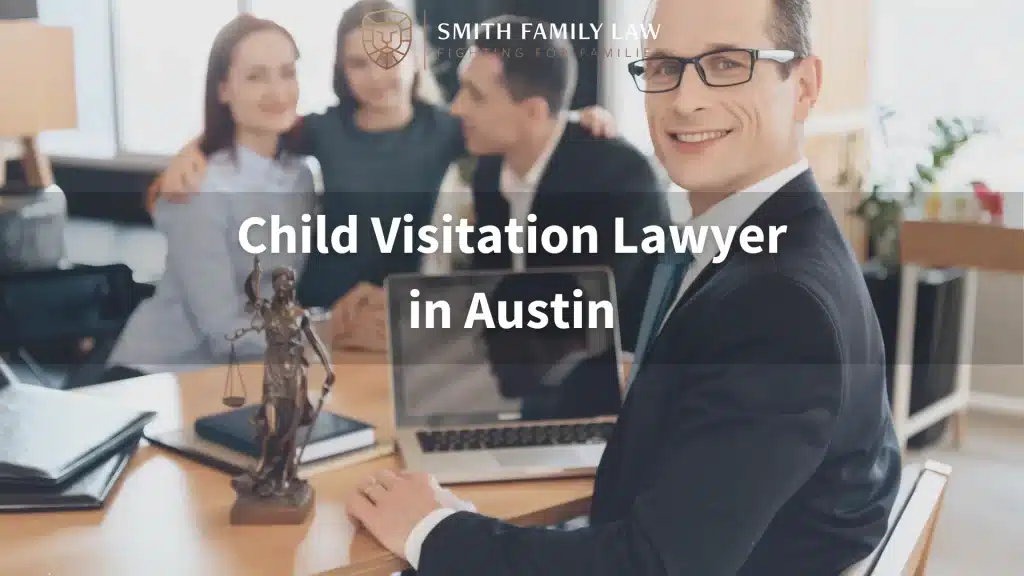Divorce is hard for everyone, and when children are involved, arranging custody and visitation can be even more contentious. Parents who aren’t living together may require legal assistance to work out the custody of a child. This process should consider the child’s best interests and the preferences of both parents and the child. However, this can get tricky.
A child visitation lawyer in Texas can help you understand the Texas Family Code statutes that apply in your case and fight for your time with your child. Contact the child custody lawyers of Smith Family Law today to get started with a confidential case review.
Child Visitation in Austin
In other states, “custody” and “visitation” are the terms for the time divorced or separated parents spend with their children. In Texas, when referring to how divorced, separated, or unmarried parents care for, live with, or visit their child, Texas law uses the terms “conservatorship” and “possession and access.” Parents may share the conservatorship of the child, even if one parent is the primary custodial parent.
Parents may share physical conservatorship, or custody, and legal conservatorship, which is the ability to make decisions for the child. The parents may submit a conservatorship/possession and access agreement to the court for approval. Alternatively, the court may use the standard possession order written into the law. Either way, a Texas family law judge must approve any child custody/visitation arrangement to ensure it’s in the child’s best interest.
Possession Orders in Texas
In Texas, physical and legal conservatorship of the child is separate from each parent’s possession and access. Even with joint managing conservatorship, one parent is designated to have physical conservatorship. The parent with physical conservatorship will be the one to establish the child’s primary residence. The “primary parent” refers to the parent with whom the child primarily resides and often holds more than half of the child’s physical possession (primary custody). The term “non-primary” parent may apply to the other parent. This can be the case even if they have the child for nearly half of the time.
Possession and access orders, or visitation orders, aim to foster strong parent-child relationships through shared time.
A child sees the non-primary parent on the schedule listed in the possession order. The possession order sets forth the days and times the child is with the non-primary parent. Establishing parental rights and a visitation schedule can prevent conflicts over child custody and visitation. It also helps establish arrangements for holidays or a birthday celebration with each parent.
The Texas Standard Possession Order (SPO)
In September 2021, the Texas Standard Possession Order was updated to give the non-primary parent access and visitation along the following weekly schedule (with exceptions for holidays or school breaks):
- Every Thursday from 6 p.m. to 8 p.m.
- The first, third, and fifth weekend each month, from 6 p.m. on Friday to 6 p.m. on Sunday, of that same weekend
- Spring break, in even-numbered years, starting at 6 p.m. on the day school is out and lasting through the break until 6 p.m. the day before school is back in session. The primary parent has the same spring break schedule in the odd-numbered years.
This law makes provision for Christmas, Thanksgiving, Mother’s Day, Father’s Day, the child’s birthday, and summer vacation, as well.
Expanded Standard Possession Order (ESPO)
The Expanded Standard Possession Order in Texas aims to provide the non-primary parent with more time with the child and is an available option for visitation rights. This schedule may be appropriate for families that live more than 100 miles apart. Under the ESPO, the non-primary parent may have possession and access to the child along the following schedule:
- Thursdays each week from the time school lets out to the time school begins on Friday morning. So, the child would have one overnight visit with the non-primary parent each week
- The first, third, and fifth weekends of each month, from the time school lets out on Friday to the time school begins on Monday
- Holiday break possession and access starting when school lets out for the break until the time school resumes at the end of the break
Extended Summer Possession
Child visitation rights in Texas also consider access and possession of the child during summer breaks. The non-primary parent may have the child for up to 30 days over the summer break. However, they must provide timely notice to the primary parent. However, suppose the non-primary parent does not give timely, proper notice (usually in writing, a few months in advance) to the child’s other parent. In that case, they still get 30 days with the child, although per Texas law, those days occur during the month of July only.
The primary parent will have one weekend of possession and access during the extended summer possession of the non-primary parent.
What Is “Child’s Best Interests” in Family Law?
In Texas child custody cases, the family law judge for the case makes conservatorship and possession and access determinations based on the child’s best interest. They consider each parent’s ability to provide a safe, stable home and proximity to the child’s school. A parent’s job may be considered, too. For example, a parent who works nights or is on-call frequently may be unable to properly supervise the child.
If a child has a preference about which parent to live with, the judge may be petitioned to interview the child privately in chambers. One parent’s attorney may file this petition. Alternatively, the child may be represented by an attorney ad litem, responsible for representing the child’s interests. If the child is over 12, the judge must meet with them. However, if the child is under 12, the judge has the discretion to decide whether to conduct an interview.
Often, it is in the child’s best interest to spend substantial time with each parent to maintain those relationships. However, a judge may review the family dynamic and child relationships to decide which living arrangement offers the safest and most beneficial environment for the child’s well-being and growth.
Standard Possession Order for Child Visitation
The Texas legislature changed the SPO, effective September 1, 2021, to give more access to the non-primary parent. The new standard visitation law in Texas introduces different Standard Possession Order (SPO) arrangements. These arrangements vary based on the distance between the residences of each parent.
Per the Texas Office of the Attorney General (OAG), the following applies to shared parenting time:
- Parents living 50 miles apart or less may have the SPO or ESPO
- Parents living between 51-100 miles apart may have either the SPO or ESPO, including school breaks and Mother’s Day and Father’s Day, per the OAG
- Parents who live more than 100 miles apart have different standard options for the non-primary parent to have possession and access to the child, per the OAG
These are just the standard possession orders. In Texas, child custody laws allow parents to devise their own arrangements, provided these arrangements serve the child’s best interest.
Can a Child Refuse Visitation?
No. This is a frustrating situation for many parents. You may be heartbroken if your child refuses to see you or if they cry when it’s time for you to pick them up. Perhaps you’re the primary custodial parent, and you don’t know how to “force” your child to go to the other parent’s home. Although we don’t recommend manhandling the child into the car at pick-up time, there are ways that you can encourage the child to go see their other parent.
If the primary custodial parent denies the other parent access to their child against the established custody arrangement, the court could hold that parent in contempt.
Can a Parent Lose Visitation Rights?

- The child is suffering abuse or neglect.
- The parent is a habitual drug or alcohol user
- The parent engages in criminal behavior that endangers the child.
- One parent abandoned the child, which means they failed to see them for at least six months
You and your child custody lawyer may need to provide proof to a family law judge that one of these occurred if you wish to terminate the visitation rights of the other parent.
Do You Need Help with Child Visitation in Texas?
Are you having trouble working out a possession and access schedule with your child’s other parent? Do you need help modifying an existing possession and access order? Our team of experienced Austin family attorneys can assist in creating an arrangement for your child’s best interests. This arrangement also ensures that both parents have the opportunity to play an active role in the child’s life. Contact Smith Family Law today at (512) 277-3166 or by filling out our online form for a free consultation with one of our compassionate child custody attorneys.
Related Reading:
